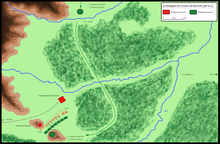Battle of Vosges (58 BC)
| Battle of Vosges | |||||||
|---|---|---|---|---|---|---|---|
| Part of the Gallic Wars | |||||||
 Battle between Caesar and Ariovistus (on the lower left) and location of the camps. | |||||||
| |||||||
| Belligerents | |||||||
|
| Suebi | ||||||
| Commanders and leaders | |||||||
| Gaius Julius Caesar | Ariovistus | ||||||
| Strength | |||||||
| 25,000–30,000 (6 legions with cavalry and auxiliaries)[1] | 15,000[2] | ||||||
| Casualties and losses | |||||||
| Unknown | Heavy | ||||||
The Battle of Vosges, also referred to as the Battle of Vesontio, was fought on September 14,[3] 58 BC between the Germanic tribe of the Suebi, under the leadership of Ariovistus, and six Roman legions under the command of Gaius Julius Caesar. This encounter is the third major battle of the Gallic Wars. Germanic tribes crossed the Rhine, seeking a home in Gaul.
Prior to the battle, Caesar and Ariovistus held a parley.[4] Ariovistus' cavalry cast stones and weapons at the Roman cavalry.[4] Caesar broke off negotiations and instructed his men not to retaliate to prevent the Suebi from claiming they were induced into a trap by their accepting an opportunity to talk.[4] The following battle resulted in a Roman victory, allowing them to secure the eastern borderlands of Gaul and to temporarily construct Caesar's Rhine bridges for a temporary tactical punitive assault staged in western Germania.
Background[]
In 61 BC, Ariovistus, chieftain of the Suebi tribe and a king from the Germanic peoples, resumed the tribe's migration from eastern Germania to the Marne and Rhine regions.[5] Despite this migration encroaching on Sequani land, they sought Ariovistus' allegiance against the Aedui. In 61 BC, the Sequani rewarded Ariovistus with land following his victory at the Battle of Magetobriga.[5][6][7] Ariovistus settled the land with 120,000 of his people. When 24,000 Harudes joined his cause, he demanded the Sequani give him more land to accommodate them.[6][8] This demand concerned Rome because if the Sequani conceded, Ariovistus would be able to take all of their land and attack the rest of Gaul.[9]
Following Caesar’s victory over the Helvetii, most of the Gallic tribes congratulated him and sought to meet in a general assembly.[10] Diviciacus, the head of the Aeduan government and spokesmen for the Gallic delegation, expressed concern over Ariovistus' conquests and for the hostages he had taken.[11][12] Diviciacus demanded that Caesar defeat Ariovistus and remove the threat of a Germanic invasion otherwise they would have to seek refuge in a new land.[8] Not only did Caesar have a responsibility to protect the longstanding allegiance of the Aedui, but this proposition presented an opportunity to expand Rome's borders, strengthen loyalty within Caesar’s army and establish him as the commander of Rome’s troops abroad.[12]
The senate had declared Ariovistus a "king and friend of the Roman people" in 59 BC, so Caesar could not easily declare war on the Suebi tribe.[13] Caesar said he could not ignore the pain the Aedui had suffered and delivered an ultimatum to Ariovistus demanding that no Germanic tribesman cross the Rhine, the return of Aedui hostages and the protection of the Aedui and other friends of Rome.[14] Although Ariovistus assured Caesar that the Aedui hostages would be safe as long as they continued their yearly tribute, he took the position that he and the Romans were both conquerors and that Rome had no jurisdiction over his actions.[15] With the attack of the Harudes on the Aedui and the report that a hundred clans of Suebi were trying to cross the Rhine into Gaul, Caesar had the justification he needed to wage war against Ariovistus in 58 BC.[16][15]
Prelude[]
Learning that Ariovistus intended to seize Vesontio, the largest Sequani town, Caesar began marching his troops toward it. Some of his officers held their posts for political reasons only and had no war experience. Consequently, they suffered from poor morale, which threatened Caesar's campaign. He challenged the officers and their legions, saying that the only legion he could trust was the 10th. With their pride on the line, the other legions followed the 10th's lead, determined not to be outdone. Consequently, Caesar arrived in Vesontio before Ariovistus.[17][18]
Ariovistus sent emissaries to Caesar requesting a meeting. They met under a truce at a knoll on the plain. The truce was violated when Caesar learned Germanic horsemen were edging towards the knoll and throwing stones at his mounted escort.[19] Two days later, Ariovistus requested another meeting. Hesitant to send senior officials, Caesar dispatched , his trusted friend, and Caius Mettius, a merchant who had traded successfully with Ariovistus. Insulted, Ariovistus threw the envoys in chains.[20][21] Ariovistus marched for two days and made camp two miles (3.2 km) miles behind Caesar, thus cutting off his communication and supply lines with the allied tribes. Unable to entice Ariovistus into battle, Caesar ordered a second smaller camp built near Ariovistus' position.[22]
Battle[]
The next morning Caesar assembled his allied troops in front of the second camp and advanced his legions in triplex acies (three lines of troops) towards Ariovistus. Each of Caesar's five legates and his quaestor were given command of a legion. Caesar lined up on the right flank.[23] Ariovistus countered by lining up his seven tribal formations. Caesar was victorious in the battle that ensued due in large part to the charge made by Publius Crassus. As the Germanic tribesmen began to drive back the Roman left flank, Crassus led his cavalry in a charge to restore balance and ordered up the cohorts of the third line. As a result, the whole Germanic line broke and began to flee.[24][25] Caesar claims that most of Ariovistus' one-hundred and twenty thousand men were killed. He and what remained of his troops escaped and crossed the Rhine, never to engage Rome in battle again. The Suebi camping near the Rhine returned home. Caesar was victorious.[26][27]
Notes[]
- ^ Delbrück, Hans, 1980 Renfroe translation, The Barbarian Invasions, p. 46
- ^ Delbrück, Hans, 1980 Renfroe translation, The Barbarian Invasions, p. 46
- ^ Alex Schweizer, Allgemeine schweizerische Militärzeitung, 1903, 31. Januar 2021 [1]
- ^ Jump up to: a b c Caesar, Julius, De bello gallico Archived January 15, 2015, at the Wayback Machine, caes.gal.1.43
- ^ Jump up to: a b Grant 1974, p. 87.
- ^ Jump up to: a b Walter 1952, p. 159.
- ^ Goldsworthy 2007, p. 246.
- ^ Jump up to: a b Fuller 1965, p. 106.
- ^ Goldsworthy 2007, p. 159.
- ^ Walter 1952, p. 158.
- ^ Walter 1952, pp. 158, 161.
- ^ Jump up to: a b Goldsworthy 2007, p. 271.
- ^ Goldsworthy 2007, p. 247.
- ^ Fuller 1965, p. 107.
- ^ Jump up to: a b Goldsworthy 2007, p. 272.
- ^ Walter 1952, pp. 163–165.
- ^ Goldsworthy 2007, pp. 274–275.
- ^ Fuller 1965, p. 108.
- ^ Walter 1952, pp. 173–176.
- ^ Walter 1952, p. 177.
- ^ Goldsworthy 2007, p. 277.
- ^ Goldsworthy 2007, pp. 277–278.
- ^ Goldsworthy 2007, pp. 279–280.
- ^ Fuller 1965, p. 109.
- ^ Goldsworthy 2007, pp. 280–281.
- ^ Grant 1974, p. 89.
- ^ Goldsworthy 2007, p. 281.
References[]
- Fuller, J. F. C. (1965). Julius Caesar: Man, Soldier, and Tyrant. London: Hachette Books. ISBN 978-0-306-80422-9.
- Gaius Julius Caesar: The conquest of Gaul, ISBN 978-0-14-044433-9, translated by S. A. Handford and revised by Jane F. Gardner
- Goldsworthy, Adrian (2007). Caesar, Life of a Colossus. London: Orion Books. ISBN 978-0-300-12689-1.
- Gilliver, Catherine (2003). Caesar's Gallic wars, 58–50 BC. New York: Routledge. ISBN 978-0-203-49484-4. OCLC 57577646.
- Walter, Gérard (1952). Caesar: A Biography. Translated by Craufurd, Emma. New York: Charles Scribner’s Sons. OCLC 657705.
| Wikimedia Commons has media related to Battle of Ochsenfeld. |
- Battles of Julius Caesar
- 58 BC
- 50s BC conflicts
- Battles of the Gallic Wars
- Battles in Grand Est
- Battles involving Germanic peoples
- Battles involving the Suebi
- Military history of Germany
- Marcomanni
